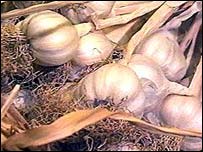 The chemical which gives garlic its flavour could be used in a “smart bomb” to fight cancer, scientists say.
The chemical which gives garlic its flavour could be used in a “smart bomb” to fight cancer, scientists say.
The finding comes just days after it was revealed the same chemical, allicin, could treat the hospital superbug MRSA. The cancer treatment harnesses the natural chemical reaction in which allicin is produced. The journal Molecular Cancer Therapeutics details how the reaction can be triggered at tumour sites.
The medicinal properties of garlic have long been recognised
Sara Hiom, Cancer Research UK: “Allicin is a toxic, but unstable, chemical which breaks down quickly and harmlessly when it is eaten.”
It is not present in unbroken cloves of garlic, but is produced as a biochemical reaction between two substances stored apart in tiny, adjoining compartments within each clove – the enzyme, alliinase, and a normally inert chemical called alliin. If the clove is broken, as it is in cooking, the membranes separating the compartments are broken and allicin is produced.
Chemical reaction
Israeli researchers decided to try to recreate this toxic reaction at the site of a tumour.
To target the treatment, they used an antibody which had been programmed to recognise distinctive receptors on the tumour cells’ surface. The antibody is chemically bound to alliinase and injected into the bloodstream where it seeks out cancer cells. Alliin is then also injected. When it encounters the alliinase, the resulting reaction turns the alliin molecules into allicin, which penetrates and kills the tumour cells.
Healthy cells nearby are left intact because they have not attracted the antibodies. The researchers from the Weizmann Institute in Rehovet successfully used the technique to block the growth of stomach tumours in mice. They say the method could work for most types of cancer, as long as a specific antibody can be designed to recognise receptors unique to the cancer cells. The technique could prove invaluable for preventing metastasis following surgery.
Professor David Mirelman, who led the research, said: “Even though doctors cannot detect where metastatic cells have migrated and lodged themselves, the antibody-alliinase-alliin combination should chase them down and destroy them anywhere in the body.”
Sara Hiom, a science information manager for Cancer Research UK told BBC News Online: “The medicinal properties of garlic have long been recognised.
“These are encouraging preliminary data. The challenge now will be to develop methods for use against different types of tumour cells and eventually to adapt the technique for use in humans so that the necessary clinical trials can be carried out.”
(Vgl. Meldung vom 2003-12-29.)
Source
BBC-News vom 2003-12-31.
Share
Renewable Carbon News – Daily Newsletter
Subscribe to our daily email newsletter – the world's leading newsletter on renewable materials and chemicals










